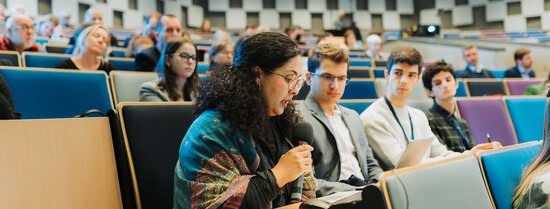On 18th March 2023, the Design Impact Transition (DIT) Platform invited NRC journalist Wouter van Noort to engage in a dialogue about the new Master’s program: Societal Transitions.
Master Societal Transitions titillates between multiple realities to weigh in lessons and developments from the past and present, to pave the future. Thus, Wouter was able to provide great insights for (potential) students aiming at societal transformations through his personal navigation with regards to transcending the ‘reductionist’ and ‘institutionally organized’ mechanisms of the journalism industry.
‘A change-driven master’
During our conversation with Wouter, we explored how the master program equips students with the knowledge and skills necessary to understand, interpret and work on complex societal transitions - to ensure a just and sustainable future for all. Drawing from his own professional experience, Wouter shared how important it is to learn about the many ways in which societal transitions contribute to the ‘decentralization of power’ within the status quo. He suggested that the master program plays an enabling role in attempting to make sense of unanswerable realities such as mechanistic (global) networks and the impending ecological collapse.
“If this master’s was around when I was a student, I would have loved to do it!” - Wouter van Noort
Curriculum: Societal Transitions

‘What can students expect?’
The information session ranged from dialogue regarding the ‘flowing curriculum and its role in understanding complexity’ to how the curriculum offers a ‘combination of perspectives’ through matching hard sciences and philosophical disciplines with fundamental value clashes, by:
● Constantly asking the right questions;
● Allowing the questions to be developed out in the field;
● Transcending the philosophical state;
● And finally, re-iterating between theory and practice to look for ‘concrete actions’.
‘Connecting wisdom to new problems’.
Wouter also reflected on how the master enables ‘modern leadership’ by serving as a useful model for self- positioning. Modern leadership is impact driven and in conjunction with the multiple stakeholders and realities involved. Thus, the master challenges the predefined criterion regarding practical and scientific methodologies. Moreover, it offers a transitional, almost forgotten path towards ‘hope’ which combines the calculated cynicism from ‘pessimism’ and the relief associated with ‘optimism’. Therefore, the program Societal Transitions aims to distill skills within students to drive the transformation of every global and local system in the coming decade through a structure of ‘autonomy but also coherence’. As Wouter summarizes the program ever so precisely:
“Life is all about preventing entropy through multiple realities, and that is what this program is for” - Wouter van Noort.
Interested?
Read more about the master here.
- CV
Wouter van Noort is a technology journalist at Dutch daily newspaper NRC . His work focuses on technical complexity, and the nuances of Artificial Intelligence in modern societal evolutions. Besides that, van Noort also co-hosts the NRC Future Affairs podcast, to drive conversations about ideas for a better future that are “too big for twitter and too unfinished for paper”.
- More information
About the Design Impact Transition (DIT) platform
DIT is a strategic initiative of Erasmus University Rotterdam. We create infrastructures for more transformative academic work at EUR and beyond. Read more here, follow us on LinkedIn and subscribe to our newsletter.

